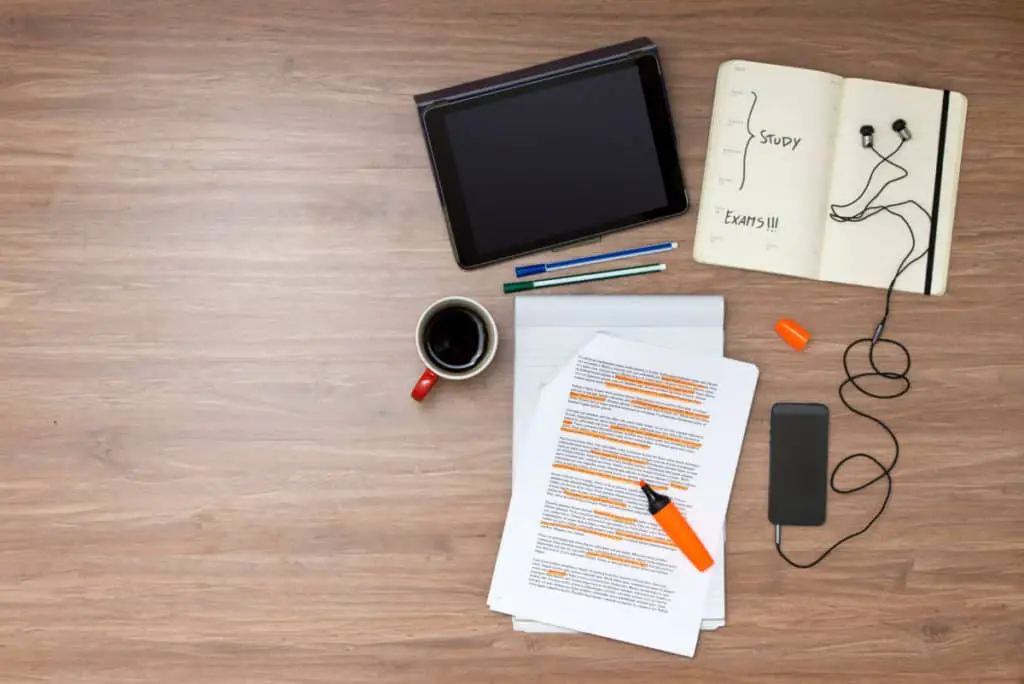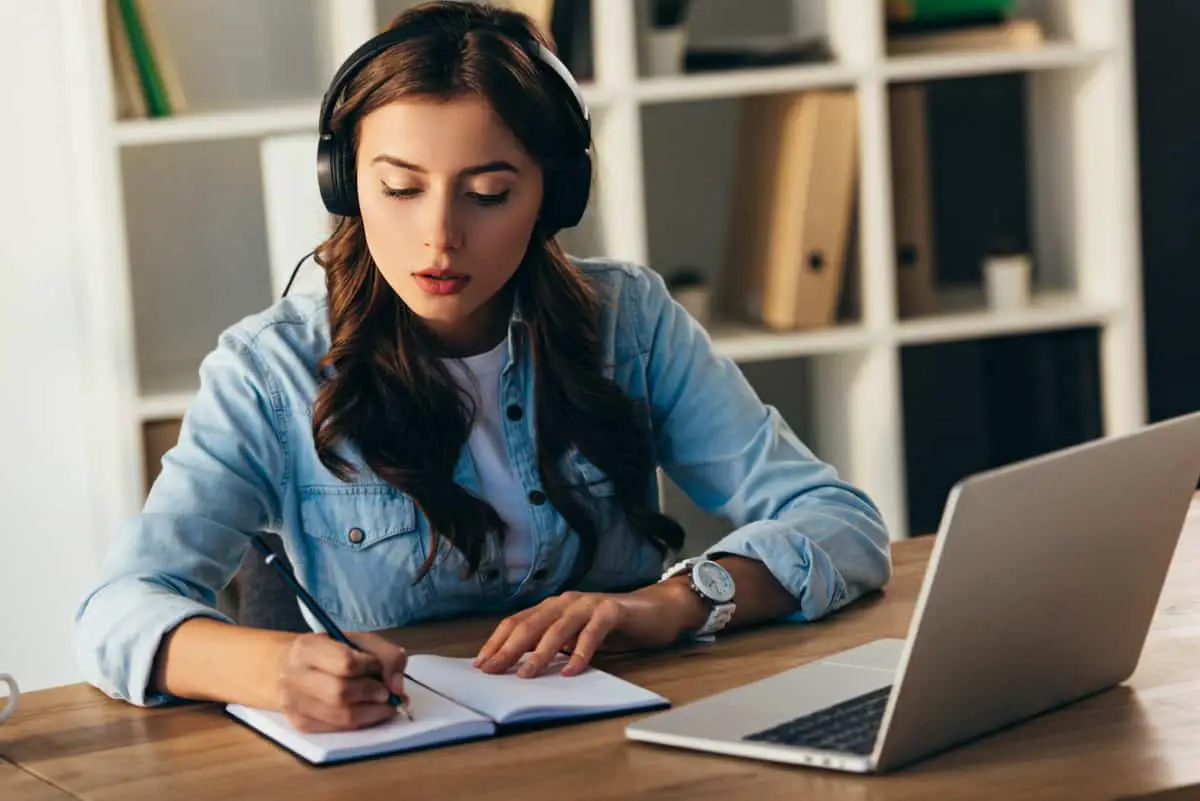What do you do when you need to study, but your neighbors, roommates, or family are too loud? Most students will ask this question from time to time (I know I certainly did!). Here are the best tips that I have found to help you study when it’s noisy.
To study when it’s noisy, you want to…
- Avoid the noise by:
- going to a quiet place
- asking people to be quiet
- changing when you study
- Block out the noise with:
- earplugs
- earmuffs
- noise-canceling headphones
- Replace the noise with:
- music
- background noise
While it may seem like not being able to concentrate with noise is out of your control, there are a surprising amount of things that you can control to help you study even when it’s noisy. The trick is to find the best places, noise-canceling headphones, and background noise for studying.
My favorite tool for studying is Bose earphonesso that you can block out noise and concentrate. I have used Bose for over a decade, and they are my absolute favorite earphones! They block out noise much better than any other brand I have tried.
Why can’t I concentrate when there is noise?
Before we go more in-depth on how to concentrate when it’s noisy, let’s look at why we have such a hard time concentrating when there is noise.
According to eLife Sciences , our brains have a limited capacity for attention. Background sounds are new sensory information that can divert brain activity and re-direct our attention. Since our attention keeps being re-directed, we have trouble concentrating.
, our brains have a limited capacity for attention. Background sounds are new sensory information that can divert brain activity and re-direct our attention. Since our attention keeps being re-directed, we have trouble concentrating.
Check out all the benefits of Prime Student. Click here
to sign up for Prime Student.
Avoid Noise When Studying
The best solution would be to find a way to avoid studying when it’s noisy. You can do this in several ways.
Change study spaces
If where you are at is loud, then move to a quieter area. Find a local spot that is conducive to studying. Libraries are quiet places. Many even have specific areas or private rooms to study in. Check out local public libraries. You don’t have to have a library card to study there.
You may also be able to go to university libraries even if you are not a student there. Learn more about who can go to college libraries.
If the weather is nice, go to a nearby park. You can find a quiet place to study with the bonus of getting some fresh air!
Another place that many people don’t think to go to for studying are churches. Churches are quiet and open to the public. You don’t need to be a member (or ready to convert) to go and see if there is an area where you can study.
Ask people to be quiet
If you need to study at home (many people do), talk to your roommates or family about the noise level. Nicely tell them that you cannot study when there is a lot of noise and see if you can make a schedule when they will not be home or will be willing to be quiet so that you can study. You might be surprised by how supportive your friends and family are, don’t underestimate them! Either way, it doesn’t hurt to ask!
Get creative with your study times
If you are saying that won’t work, my house is too noisy to study, then you may need to get creative with when you study. See if you can get up early or go to bed late to study. This way, everyone will be asleep and, therefore, quiet (unless they are loud snorers, in which case you have a whole new issue to worry about).
Block Out Noise When Studying
If you cannot avoid noise, then try to block out noise. The main ways to do this are with:
- Earplugs
- Earmuffs
- Noise-canceling headphones
Earplugs
As someone who cannot study or sleep with any background noise and suffers from bad migraines, I have A LOT of experience testing different products to block noise. Earplugs can be good for sleeping but are not the best option to block out noise while studying (at least in my experience).
However, depending on your level of sound sensitivity, earplugs may do the trick. Considering how inexpensive and discreet earplugs are, I would definitely give them a try!
The main kinds of earplugs are pre-molded silicone, foam, and silicone wax.
The silicone wax earplugs are the most moldable to your ears and, therefore, can offer the best noise reduction and comfort. I have used many different earplugs over the year, and these are the best earplugs that I have found. They are what I use and always recommend.
are the most moldable to your ears and, therefore, can offer the best noise reduction and comfort. I have used many different earplugs over the year, and these are the best earplugs that I have found. They are what I use and always recommend.
Foam earplugs are also a good option. They aren’t as good at blocking the noise, but they are more convenient to reuse.
are also a good option. They aren’t as good at blocking the noise, but they are more convenient to reuse.
Earmuffs
Earmuffs go over your ear. They are bulkier but can do a good job of blocking out sound.
I got a cheap pair like this , and they do a good job of blocking out the noise, especially when you wear earplugs or noise-canceling headphones underneath.
, and they do a good job of blocking out the noise, especially when you wear earplugs or noise-canceling headphones underneath.
Noise-canceling headphones


If you really want to block out noise, it is worth investing in a good pair of noise-canceling headphones.
Noise-canceling headphones can help you study by blocking out the noise better than any other product or method.
The best noise-canceling headphones to wear when you study are Bose noise-canceling headphones .
.
I tried a bunch of noise-canceling headphones before I found these. No other headphones came anywhere close to this level of noise reduction and comfort. I joke that if my house ever caught on fire, these are my prized possession that I would grab (plus, I would need them to quiet the fire engine sirens). This is only partially a joke. I love these earphones that much!
I am frugal by nature and rarely consider more expensive purchases worth it, but I have purchased these 5 times. Absolutely worth it!
Pro Tip: They have a 1-year warranty, but if they break after that, then you can get a big discount by calling and asking for a replacement order. You will need the code to do this, so keep the packaging and write down the code on the left earbud right away because this will get worn down over time.
If you really want to block out loud noise (such as a lawnmower, construction, or fireworks), the best combination is in-ear noise-canceling headphones playing white noise with earmuffs over them. This is the trifecta of sound reduction!
Replace the Noise
If you can’t avoid or block the noise, then it can be helpful to replace the noise. You can do this with more consistent environmental noise, music, or white noise.
You may be wondering how it is helpful to replace noise with more noise, but the truth is that all noise is not the same level of distraction. According to Harvard Business Review, it’s not the noise itself but the interruptions that are distracting. That is why the best noise for studying is background noise that is consistent, not intermittent.
it’s not the noise itself but the interruptions that are distracting. That is why the best noise for studying is background noise that is consistent, not intermittent.
White Noise
White noise is fantastic background noise for studying.
Putting in headphones and playing white noise can be a great way to drown out the distracting noise with noise that you can more easily ignore.
You can find some great background noise videos on Youtube, such as….
- Cozy Cabin Ambience

- White Noise Black Screen

- White Noise Black Screen Rain Sounds for Sleeping

- Ocean Waves White Noise

or my favorite: FAN WHITE NOISE
There are also some great apps for playing background noise, such as…
- White Noise Lite
 (This is my favorite! I like the “Brown Noise” sound the best.)
(This is my favorite! I like the “Brown Noise” sound the best.) - Relax Melodies: Sleep Sounds

- White Noise Ambience Lite

Music
Some people can study while listening to music, and some people cannot. If you are someone who can, then music can be a great way to replace the noise.
When picking your music, it is important to remember that sounds that aren’t particularly interesting (that won’t divert your attention) are the best for studying. This means music without lyrics (you don’t want to start singing along to the lyrics when you are trying to study), such as classical, ambient, and house music.
Create a studying playlist for the next time you need to use your music to focus.
Different area
If you can’t replace the noise with white noise or music, it could help to move to an area where the noises and conversations are consistent and blend together. Even if this area seems louder, not having quiet that keeps being punctuated with noise can actually make it easier to concentrate.
Additional tips to concentrate with noise
Set yourself up for success
According to Medicine Net , tiredness, stress, and hunger can make concentration more difficult.
, tiredness, stress, and hunger can make concentration more difficult.
Give yourself your best chance to concentrate by eating healthy, drinking enough water, getting a good night’s sleep, and practicing relaxation techniques.
Create a productive study space
If you are studying at home, having a dedicated study space can help improve your concentration.
Create a study space where you can lay out all of your material and be away from distractions (at least as much as you can be).
Shut your doors and windows. Turn off your music, tv, and phone. Ask everyone you live with not to disturb you when you are working in your study area.
Repeatedly doing your work in the space will help build a connection between this area and concentration (much like you have a connection between getting in bed and sleeping).
When you sit down in your study space, you will be in the habit of focusing on work.
Plan ahead
Have materials ready

Part of what makes your study environment effective is that you have everything you need in one place, so you don’t need to interrupt your work to get something.
Have all your notes and books in front of you. Have any websites you’ll need on your laptop already open.
Go to the bathroom before you sit down and have a drink and snack ready so you won’t have to get up and interrupt your work.
Pick what you can best work on
If you know that a specific study time is more likely to be noisy than others, then plan to work on things that require less concentration during that time.
Pay attention to what work requires the most focus. You may find that you can still write a discussion post when you are in a noisy environment, but you cannot read.
Base your schedule around this information.
Practice meditation
Meditation can help train your awareness and attention. This will help you be able to concentrate despite the noise.
can help train your awareness and attention. This will help you be able to concentrate despite the noise.
Learn to concentrate despite the noise
We have all had times when we are so focused on something that we don’t hear someone come into the room or ask us a question. When we are in deep concentration, other noises fade away.
Try to achieve this deep state of concentration by using all your mental energy to focus on your work. Try visualizing what you are studying or relating it to your life. It is easier to focus when you are interested in the topic.
This can be difficult to do at will (and even harder to sustain), but using your mental energy on your work instead of fixating on the noise is a great way to start.
By using a combination of these tips, you will become a master at studying when it’s noisy.
If you found this post helpful, share it with your friends and leave a comment to share your best tips for concentrating when it’s noisy.



Great post! Ideas are perfect! Love it!